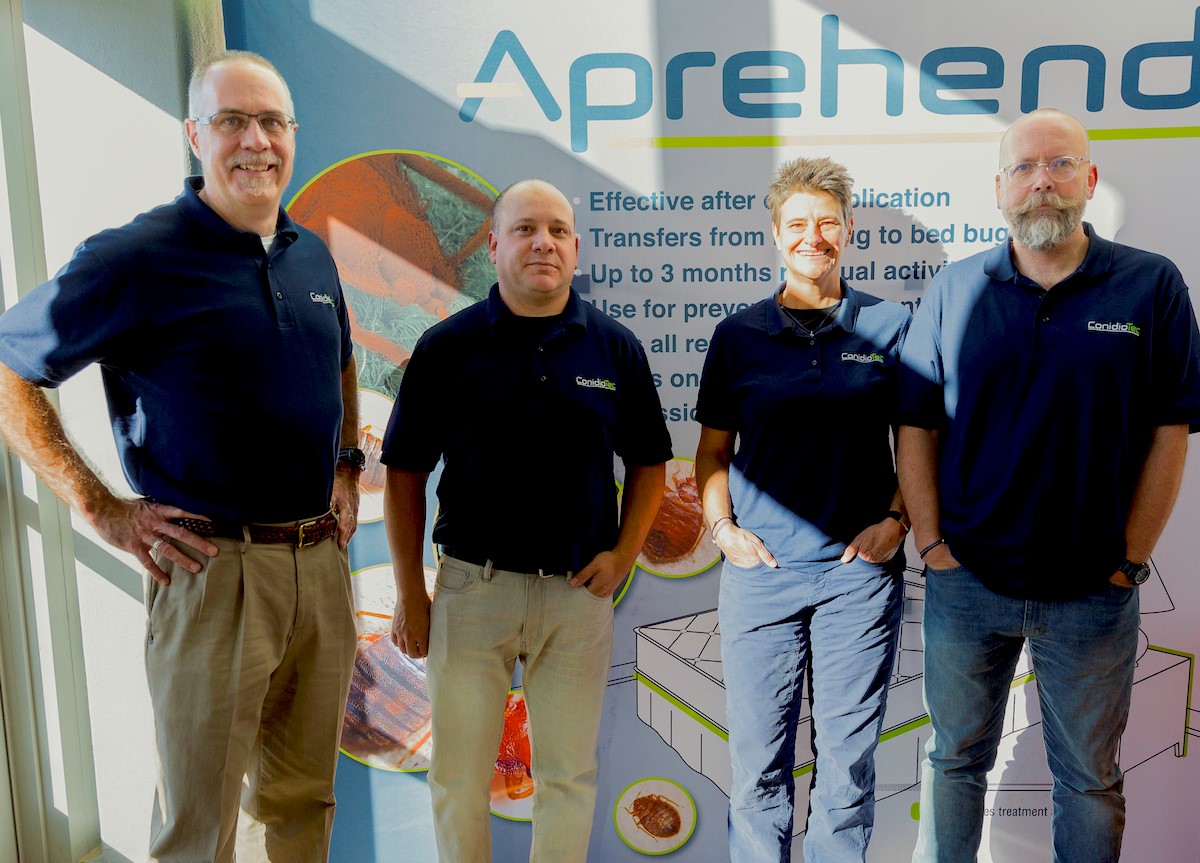Posted: May 11, 2018
Phospholutions won $80,000 in investment prizes and ConidioTec won $10,000 at this spring's Invent Penn State Venture & Intellectual Property Conference. Both startup companies are commercializing discoveries and technology developed at the College of Agricultural Sciences.
The founders and leaders from Phospholutions and ConidioTec are featured on the lineup for next month's City Lights, TED-talk-style events to showcase Invent Penn State in Harrisburg, Washington, D.C., Philadelphia and Pittsburgh, June 18-21.
Hunter Swisher, Plant Science alumnus and Phospholutions' founder, licensed a College of Agricultural Sciences technology and developed Rhizosorb, a soil-amendment product to reduce phosphorus runoff and enhance plant root growth.
Rhizosorb is sold to golf courses to promote deeper roots for their turf grass, which consequently requires less watering and fewer applications of fertilizer. CEO Swisher and his COO and business partner, Benjamin Nason, claimed their $75,000 prize amidst raucous cheers from a packed room of more than 600 entrepreneurs and investors on April 20.
Phospholutions also won first place in a Venture Connection event, in which venture capitalists and startups had quick, "speed-dating" - style meetings.
According to Swisher, an estimated 60 percent of the product applied in the $32 billion annual fertilizer market in the U.S. will wash away, and the country will spend an estimated additional $5 billion in 2018 to clean up phosphorous pollution because of runoff. He said he hopes to help solve that problem.
The opportunity to develop Rhizosorb emerged when Swisher was an undergraduate in the Department of Plant Pathology and Environmental Microbiology. He learned about a patent developed by one of his professors that had not been commercialized yet. He saw market potential and set to work developing Rhizosorb and his company, Phospholutions.
Since the April conference, Phospholutions hired two new employees and plans to soon hire more. One is fellow Plant Science classmate and horticulture alum Byron Bredael.
"Byron's position is channel sales manager and he will be managing our distribution network and direct end user sales," said Swisher. "He went off to the ornamental industry for three years in sales and we poached him as he is a rockstar."
The company in the last several weeks has also secured national organic certification, inked deals with two large distributors and is now selling product in 10 states. It plans to begin a new round of fundraising in the fall.
"The [Invent Penn State] money is allowing us to delay our fundraising and really fine tune the company's direction to better asses what we truly need to continue the momentum of growth," said Swisher.
At the Tech Tournament, Swisher was joined by 11 other entrepreneurs with startups at various stages of development, who made their cases to a panel of three judges -- venture capitalists who peppered company founders with questions about product efficacy, market development, competitors, patent protection and growth projections.
ConidioTec Wins $10,000 People's Choice Award
Entomologist Dr. Nina Jenkins pitched ConidioTec, her startup, at the conference and won the $10,000 People's Choice Award. Je
ConidioTec's product, Aprehend, is a non-toxic, effective fungal bio-pesticide, which will replace current chemical insecticide products used by pest exterminators. The product can be used for control and prevention of bed bug infestations. ConidioTec won the hearts, minds and text-in vote of the audience for the People's Choice award.
Bed bugs are a serious and growing problem in the U.S. and methods of bed bug control are often difficult. Currently there is no effective way for hotels or homeowners to prevent bed bug incursions. At best, hotels train staff in early detection and act rapidly in response to identified infestations. Bed bugs are incredibly difficult to eradicate with chemical sprays, requiring multiple applications over a period of three weeks.
Bed bug resistance to the limited number of chemical pesticides permitted for in-home use is increasing with resulting reductions in efficacy. Hotels prefer to avoid chemical treatments, as these require rooms to be out of service during the extended, multiple-treatment period. Many opt for heat treatments, which are prohibitively expensive for most homeowners and frequently fail; furthermore, they offer no protection from re-infestation by visitors or from neighboring properties.
More about Dr. Jenkins and ConidioTec.
More about the Invent Penn State Venture & Intellectual Property conference.
More about the Invent Penn State Venture & IP Conference Tech Tournament.
Social Media

Social Media


